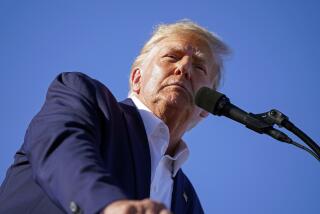Arrest of Isabel Peron signals willingness to reexamine era
- Share via
BUENOS AIRES — The arrest Friday of former Argentine President Isabel Peron in Spain signaled an expansion of human rights cases here beyond the former military junta to the epoch of ex-strongman Juan Domingo Peron, father of Argentina’s ruling party.
The 75-year-old former president, whose full name is Maria Estela Martinez de Peron, was arrested at her home near Madrid after a federal judge in Argentina issued a warrant for her detention, officials said. A Spanish tribunal ordered her conditional release pending an extradition request from Argentina.
She is wanted for questioning in connection with the disappearance of a student activist in February 1976, during the final weeks of her presidency.
Isabel Peron is the widow and successor in office of Juan Peron, three times elected president and still an iconic and controversial figure in his homeland. As the sitting vice president, the ex-dancer assumed the presidency when her husband died in July 1974.
Argentina’s only woman president never enjoyed the popularity of Peron’s previous wife, the charismatic Eva “Evita” Peron, who is still idolized here more than half a century after her death. Economic and political turmoil marked the reign of Isabel Peron, who was toppled in a military coup in March 1976.
The strongman’s admirers have largely ignored his dark side, such as his regime’s welcoming of Nazi war criminals after World War II and the right-wing death squads that sprung up during his final term. Critics call him a demagogue who stifled freedoms and crushed dissent while admiring European fascists such as Benito Mussolini of Italy.
The current Peronist administration has aggressively targeted hundreds of abusers from the junta that succeeded Peron and his wife. The former military leaders are widely despised here, and Argentines have generally applauded their prosecutions.
But Juan Peron, with his exaltation of the working classes and strong ties to labor unions, remains a beloved figure for many. His political movement, which embraced elements of the left and right, continues to dominate Argentine politics.
Investigators are now zeroing in on government-linked death squads that, human rights groups say, operated with impunity during the tumultuous 1970s rule of Peron and his widow. The sanctioned killers, these groups say, set the stage for the subsequent “dirty war” under military rule that cost as many as 30,000 lives during a dictatorship that lasted from 1976 to 1983.
Isabel Peron is being sought in connection with decrees she signed in office that called on security forces to “annihilate ... subversive elements throughout the country.” By then, the Peronists had turned violently against their former left-wing allies and forced them underground.
A separate judicial inquiry is examining a right-wing death squad called the Argentine Anticommunist Alliance, known as Triple A, that operated during the administrations of both Perons. Rights groups say Triple A was responsible for about 1,500 extrajudicial assassinations.
A judge in the capital has ordered the arrest of several former Triple A leaders. Whether the various inquiries will lead to the late Peron himself and sully his image remains unclear. Many believe it is unlikely Peron will ever be despised as much as the former military rulers who “disappeared” thousands of opponents and led Argentina to the ruinous Falklands War in 1982.
Argentines have shifted much of the blame for abuses during the Peron governments to a now-deceased former aide, Jose Lopez Rega, a thuggish figure often described as the founder of Triple A.
But critics say it is inconceivable that the strong-willed Peron himself didn’t approve of the government-backed death squads created during his reign.
“Eventually people must ask themselves if it’s plausible that the president and person in charge when the Triple A was set up knew nothing about it,” said James Neilson, a columnist for the newsmagazine Noticias.
Argentine President Nestor Kirchner is a lifelong Peronist and leftist who has made bringing military abusers to justice a centerpiece of his administration. He seldom publicly invokes the memory of Peron, and has signaled no opposition to the aggressive prosecution of Peron-era figures linked to death squads -- even if it leads to the founder of the movement he represents.
“We want reconciliation, but without impunity,” Kirchner told the daily Clarin after the judge’s order for Isabel Peron’s arrest in Spain. “The truth has to be known, whatever it is.”
Andres D’Alessandro of The Times’ Buenos Aires Bureau contributed to this report.
More to Read
Sign up for Essential California
The most important California stories and recommendations in your inbox every morning.
You may occasionally receive promotional content from the Los Angeles Times.













